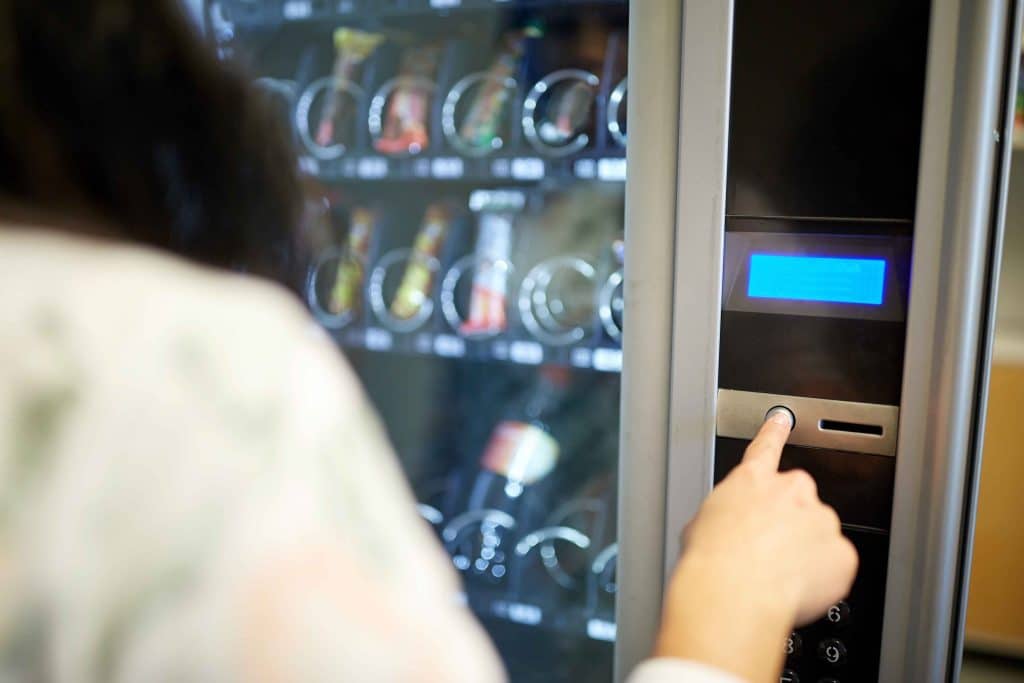In the domain of vending machine investment, understanding the myriad cost factors is paramount. These factors range from the obvious – such as initial purchase and operational costs – to the more subtle, including planned obsolescence and technological advancements.
However, the true complexity lies not in identifying these factors, but in their strategic interpretation and application in your investment strategy. It is this intricate dance between cost, strategy, and future trends that we will explore further.
Get Free Consultation
Key Takeaways
- Vending machine costs extend beyond the initial purchase price, including ongoing operational expenses and potential hidden fees.
- Key factors influencing vending machine cost include hardware, features, and brand quality.
- Strategic considerations when buying vending machines involve balancing needs versus budget and projected ROI.
- Future trends in vending machine pricing may be influenced by technological advancements and evolving market dynamics.
Introduction to Vending Machine Costs
When considering vending machine investments, understanding their pricing structure is essential. The machines come in a broad range, from basic models to high-end smart versions, each with its own cost implications. Moreover, the initial investment in vending machines impacts the overall business strategy.
Read more about our Smart Vending Solutions!
Understanding Vending Machine Pricing
Often, understanding the pricing of vending machines can seem like a complex task due to the variety of factors that influence costs. The cost of vending machines can vary greatly, depending on whether you opt for a traditional model or a technologically advanced smart vending machine.
The price of a vending machine also depends on the features it offers. For instance, a touch screen vending machine or a digital vending machine equipped with smart vending software can cost more than a basic model. The choice of vending machine store can also impact the price, as different stores offer varying pricing structures.
Moreover, the advent of automated stores and unmanned stores have introduced new cost factors, making the vending machine cost an integral part of the investment strategy.
Range of Vending Machine Investments
In the world of vending machine investments, the options span a broad spectrum, from basic, low-cost models to high-end, technologically advanced machines. The cost of a vending machine can greatly vary based on several factors:
- Basic vending machines: These are the most affordable options, ideal for those wondering how much to buy a vending machine without breaking the bank.
- Average vending machine cost: This reflects a mid-range option that balances cost with functionality.
- Smart vending machines: A step up, smart vending introduces digital interfaces and advanced features.
- High-end digital vending machines: These are the most expensive, offering top-of-the-line technology for a premium price.
Choosing among these depends on your investment strategy and the specific needs of your vending machine stores.

Significance of Initial Investment
Grasping the significance of the initial investment in vending machines is important for determining the trajectory of your vending business venture. The upfront cost of purchasing vending machines largely shapes the financial foundation of your business, impacting both your short-term cash flow and long-term profitability.
This initial investment doesn’t just cover the machine itself, but also the expenses related to its installation, setting up, and initial stocking. More advanced machines with cutting-edge features naturally cost more than basic models, affecting your starting capital.
Hence, a thorough understanding of these costs is critical in planning your budget, setting your pricing strategy, and forecasting your potential return on investment. The initial investment is a strategic stepping stone to the successful operation of your vending business.
Key Factors Influencing Vending Machine Cost
The cost of a vending machine is greatly influenced by several key factors. These include the hardware and technology used, the features and customizations incorporated, and the brand and quality of machines selected. Each of these aspects plays an important role in determining the initial investment needed for vending machine operation.
Hardware and Technology
Diverse hardware options and technology upgrades play an essential role in determining the overall cost of vending machines.
- Traditional vending machines, being mechanical in nature, have lower upfront costs but may require more frequent maintenance.
- Digital vending machines, equipped with advanced sensors and automated systems, are more expensive but provide better functionality and efficiency.
- The inclusion of payment processing technology, such as card readers or mobile payment compatibility, adds to the initial cost but expands the customer base.
- Finally, the integration of inventory management software can increase the machine’s cost but aids in tracking sales, popular products, and restocking needs.
Therefore, understanding these hardware and technology aspects is important when budgeting for a vending machine investment.
Features and Customizations
In addition to hardware and technology, the added features and customizations of vending machines greatly contribute to the overall cost. These enhancements not only increase the machine’s appeal but also its functionality. The inclusion of touchscreen interfaces, card or mobile payment capabilities, and advanced product dispensing systems can considerably boost the price.
Customizations such as branded wraps or specific color schemes to match a company’s brand identity may also add to the expense. Additionally, the integration of smart vending software, enabling features like remote inventory monitoring and sales analytics, further increases costs.
Yet, these features can also optimize operations and boost revenue, making them a worthwhile consideration despite their impact on initial investment.
Brand and Quality
Choosing a vending machine from a reputable brand known for quality craftsmanship influences the initial investment cost, potentially increasing the price tag. Vending machine manufacturers vary considerably in relation to reputation, durability, and customer service.
Understanding the relationship between brand and quality, and how it affects your vending machine investment, involves considering the following aspects:
- Brand Reputation: Established brands often provide reliable, tried-and-tested machines.
- Quality and Durability: Premium brands usually offer machines with superior build quality, meaning fewer maintenance issues and longer lifespan.
- Customer Service: Top brands often provide better customer support, including warranty services and maintenance assistance.
- Resale Value: Quality brands typically retain value better, offering higher resale prices, which can offset the higher initial cost.
Consider these factors carefully when planning your investment strategy.
Calculating the Total Cost of Ownership
When considering the financial implications of owning a vending machine, it is important to calculate the total cost of ownership. This calculation not only includes the initial purchase price but also ongoing operational costs and potential hidden expenses.
By understanding these costs, business owners can make more informed decisions about their vending machine investments.
Initial Purchase Price
The initial purchase price for a smart vending machine constitutes a substantial portion of the total cost of ownership and varies widely based on factors such as machine type, features, and brand. To give a rough estimation, the price range can extend from $3,000 to $10,000 or more.
There are several key elements that greatly influence the initial purchase price:
- Machine Type: Whether you choose a basic model or a high-end one with advanced features.
- Features: Inclusions like touchscreen interfaces, cashless payment options, and temperature control systems can increase the price.
- Brand: Premium brands often come with a higher price tag due to their reputation for quality and reliability.
- Vendor: Prices may vary based on the vendor’s policies, services, and additional offerings.
Operational Costs
Regularly incurred after the initial purchase, operational costs for smart vending machines form an essential part of the total cost of ownership estimation. These costs include utilities such as electricity consumed by the machine, routine maintenance and repairs, restocking of products, and software updates for the intelligent systems.
A study by the National Automatic Merchandising Association found that smart vending machines consume on average $300 to $400 in electricity annually. Restocking and maintenance costs depend on the machine’s usage and location. Regular software updates are important for maintaining the machine’s smart features and customer experience.
These recurrent expenditures, while seemingly insignificant individually, can add up to considerable amounts over time, impacting the profitability of your vending machine venture.

Hidden Costs
Beyond the apparent operational expenses, a thorough understanding of hidden costs is paramount in accurately calculating the total cost of ownership for smart vending machines. These machines, while offering advanced features and conveniences, can also bring unexpected expenses.
- Software Updates and Licensing Fees: Over time, software used in smart vending machines may require updates or licenses, adding to the ongoing cost.
- Repairs and Replacements: Parts of these complex machines may need to be replaced or repaired more frequently, leading to unanticipated expenses.
- Connectivity Costs: Maintaining internet connection for these machines may incur additional charges.
- Training Expenses: Staff may require training to operate and maintain these advanced machines, which can also add to the cost.
Understanding these hidden costs can help in making a more informed investment decision.
Strategic Considerations for Buying Vending Machines
In the domain of vending machine investment, strategic considerations are vital to guarantee a favorable return. From evaluating your business needs against your budget, to selecting the most suitable vending machine provider, the decisions made can impact financial outcomes substantially.
Moreover, an analysis of potential returns on investment can provide a clearer picture of the economic viability of your vending machine venture.
Evaluating Needs vs. Budget
An important aspect of vending machine investment is the careful evaluation of business needs against available budget. It’s critical to analyze the scope of your vending business which includes the number of locations, desired products, and expected foot traffic.
Aligning these considerations with your financial capacity helps to optimize your investment.
- Type of products: The choice of products directly impacts the type of machine required, hence affecting the cost.
- Number of machines: This is influenced by the number of locations and expected customer volume.
- Machine features: Advanced features like digital screens, card readers, etc can increase the price but might offer better ROI.
- Maintenance and operation cost: Budgeting for regular maintenance and operation expenses is important to ensure smooth business operation without unexpected financial burdens.
Choosing the Right Vending Machine Store
Exploring the intricate landscape of vending machine retailers plays a pivotal role in securing a successful investment. Primary considerations should include pricing, product range, after-sales service, and reputation. Retailers with competitive pricing and a wide array of machines cater to various investment budgets and preferences.
However, one must not overlook the importance of after-sales service. Ensuring the retailer provides reliable maintenance and support services will protect your investment in the long run. Evaluating a retailer’s reputation is also critical.
Online reviews and references can provide insights into their reliability and customer satisfaction. By meticulously evaluating these factors, investors can identify a vending machine store that aligns with their investment strategy and operational needs.
Investment Return Analysis
Projecting your vending machine investment’s potential return is an important step in formulating a sound business strategy. A thorough return on investment (ROI) analysis can help you evaluate the profitability and viability of your venture.
Considering the following factors is vital:
- Revenue Generation: Evaluate the expected income based on product prices and estimated sales volume.
- Operational Costs: Include expenses like restocking, maintenance, and energy consumption.
- Amortization Period: Determine the time it will take to recoup the initial investment.
- Net Profit: Subtract total costs from total revenue to gauge profitability.
Future Trends in Vending Machine Pricing
Looking towards the future, it is important to contemplate the potential impact of technological advancements on vending machine costs. Market dynamics, shaped by consumer behavior and competition, will also undeniably play a significant role in pricing trends.
Additionally, understanding future cost-saving strategies can contribute to a more effective and efficient vending machine business model.
Technological Advancements
In the domain of vending machine pricing, technological advancements are poised to play a pivotal role in future cost determinations. Such developments, including sophisticated software, digital interfaces, and improved energy efficiency, are increasingly influencing the pricing of vending machines.
- Machine Connectivity: Internet-enabled vending machines allow for remote management, inventory tracking, and sales data analysis, but these features may add to machine cost.
- Digital Payment Options: The integration of digital wallets and contactless payment systems is a growing trend but also impacts pricing.
- Energy Efficiency: Advances in efficient cooling systems can increase machine cost, but offer long-term savings.
- Smart Vending Machines: These machines offer interactive user experiences through touch screens, potentially driving up initial costs.

Market Dynamics
While technological advancements continue to shape the domain of vending machine pricing, market dynamics constitute another significant factor that impacts these costs. Economic trends, consumer behavior, inflation, and competition influence vending machine pricing strategies.
For instance, the rising demand for healthier snack options is pressuring vending machine operators to adapt, which may incur additional costs. Additionally, demographic changes such as the millennial population’s preference for cashless payments could necessitate upgrades to card or mobile payment systems. Inflation also affects the cost of supplies and operation.
Lastly, the market’s competitive landscape could drive price reduction to remain attractive. Hence, understanding these market dynamics is paramount for an effective vending machine investment strategy.
Cost-Saving Strategies
Adopting strategic cost-saving measures is essential to maximize profits in the evolving vending machine market. As technology progresses and competition heightens, it becomes important to optimize your investment strategy.
To achieve this, consider the following strategies:
- Bulk Purchasing: Buying vending machines in bulk can lead to significant discounts.
- Energy-Efficient Machines: Investing in machines with high energy efficiency can reduce long-term operational costs.
- Preventive Maintenance: Regular servicing can prevent costly breakdowns and prolong machine life.
- Smart Stocking: Utilizing data analytics to stock popular items can increase sales and reduce waste.
These cost-saving strategies can help mitigate investment risks while enhancing returns, ensuring a successful venture in the vending machine business.
Conclusion
In essence, maneuvering the financial landscape of vending machine investment necessitates a thorough understanding of multifarious costs. Mastery of these elements, akin to a chess player strategically planning moves, can greatly enhance profitability.
Acknowledging the importance of initial investment, operational expenses, and the impact of future technology trends ultimately leads to a detailed investment strategy.
This understanding empowers vendors to make informed decisions, thereby fostering business growth and sustainability in the evolving vending machine industry.
Vending Solutions
With our smart vending solutions, grab-and-go shopping gets simpler, faster, and more personalized.
Frequently Asked Questions
How Can I Arrange Financing for My Vending Machine Investment?
Arranging financing for a vending machine investment can be done through various sources such as banks, lending institutions, or vendor financing options. It’s important to evaluate interest rates, repayment terms, and overall cost implications.
How Does the Location Affect the Profitability of a Vending Machine?
Location greatly impacts vending machine profitability. High foot-traffic areas yield higher sales. One study reveals that a vending machine in a busy location can generate 50% more revenue than one in a quieter area.
Are There Any Tax Benefits or Incentives for Investing in Vending Machines?
Yes, there can be tax benefits for investing in vending machines. Under Section 179 of the IRS code, you may be able to deduct the full or partial cost of vending machines as a business expense.
How Does the Product Selection Influence the Cost and Profit of a Vending Machine?
Product selection greatly influences both the cost and profit of a vending machine. High-demand, high-margin items can increase profitability, while products requiring special storage or dispensing features may escalate machine costs.
What Are Some Risks and Challenges Associated With a Vending Machine Business?
Risks and challenges in a vending machine business include unpredictable sales volume, machine maintenance costs, location accessibility, competition, and theft or vandalism. Effective risk management strategies are important to ensuring profitability and sustainability.

